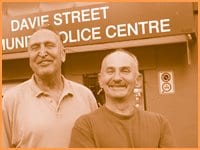Vancouver city council is poised to make a greater financial commitment to the Vancouver Police Department (VPD) and its community policing centres. What will it mean for the Davie Village and Vancouver queers?
Community police centres (CPCs), like the one on Davie St, each draw about $19,000 a year from city coffers, but the VPD has asked council to increase that amount to $100,000 a year.
“We definitely need to be guaranteed core funding,” says Davie CPC president Jim Deva. “I don’t care where or how it comes, but we shouldn’t have to do fundraising to keep the streets safe.”
Deva is optimistic the city will come through with the funding and he and the rest of the Davie CPC board have big plans for the money.
Davie CPC vice president Ron Strandberg says the police department recommends $30,000 of the proposed new funding go for rent, $30,000 for new programs and $40,000 for a permanent full-time administrator. Ultimately, budget decisions for the CPCs will be up to the individual CPC boards, Strandberg stresses. “The police are our partners, not our masters; our partners,” he says.
What would the Davie CPC do with $100,000 in core funding? “We’d be expanding our operating hours and adding more programs,” says Strandberg. “We’d like to expand into another office, perhaps on Denman St and we’d like to maintain the centre by the Shoppers Drug Mart on Davie. We’d like to hire a full-time administrator and an office coordinator.”
The rest of the money would go into additional programs, he says. There are a number of options but nothing has been decided yet.
One obstacle is that storefront rental space on Denman may be too expensive if the CPC can’t find subsidized or donated space.
Beyond new funding for the CPC, Deva says, “currently we have 50-60 volunteers and we’d like to see 100-150.”
How effective have the CPCs been in improving public safety in the Davie Village?
Strandberg says, “the police department credits us with a decrease in property crime. We recover about one stolen auto per month. We recovered a stolen $90,000 Hummer one night that was parked on Davie St.”
Deva and Strandberg say they’re not sure if the Davie CPC has helped to reduce gaybashing, but they’d both like to think so. Deva, in particular, joined the CPC board specifically in response to Aaron Webster’s 2001 killing. He says it’s still too early in the CPC’s young life to see any long-term changes in bashing patterns.
Velvet Steel of West Enders Against Violence Everywhere (WEAVE) is skeptical. “I don’t think the community policing efforts have been very effective, frankly,” she says. “People just don’t get much satisfaction from any kind of police when they have to interact with them.”
Steel says WEAVE has been collecting survey information from queerbashing victims. She says there were at least 25 unreported gaybashings over the last year. Victims sometimes don’t report the crime to police, she says, for fear the police will either do nothing or will treat the victims like criminals.
WEAVE will be releasing its complete findings in the coming weeks.
Deva says he, too, was skeptical about policing when he first joined the CPC. “But I’ve become a real champ of it. I think even the chief of police is starting to see the real value of it.
“It’s great that community policing can be the eyes and ears of the police force,” he continues, “but I hope there’ll be a certain freedom. There needs to be a live-and-let-live balance.”
Deva, Strandberg and Steel all agree that more police officers on the streets are needed to improve police response times and to curb gaybashings and other violent crimes.
There seems to be consensus also that simply flooding the streets with cops won’t alone solve the bashing problem. Increased police presence must go hand-in-glove with developing a better understanding of the gay community’s diverse needs, including the needs of its gaybashing victims.
When asked what police can do to protect queers from gaybashing, Steel says, “we need to see more beat cops. Police need to get out there more. They need to get out of their cars and walk around and interact with people.”
“The new younger officers are better educated and more liberal thinking,” says Strandberg of the police he’s met through the Davie CPC. “I’m quite encouraged by what’s happening. There are still a few I could do without, but I’m openly gay. I work with them all the time and I haven’t had any problems.”
Says VPD Inspector Val Harrison, “I hear the suggestion all the time that the general police officer is insensitive or unwilling to respond to things like gaybashing. All I can say is if you feel that way give me a specific.”
For her, the best way to stop gaybashings is through more public education. There should be age-appropriate instruction in schools, she says, and the CPCs can help with that. “Community policing could do a lot to develop printed material and education programs,” she suggests.

 Why you can trust Xtra
Why you can trust Xtra


